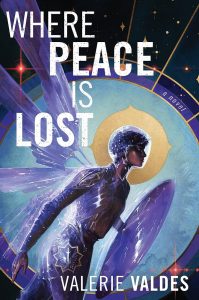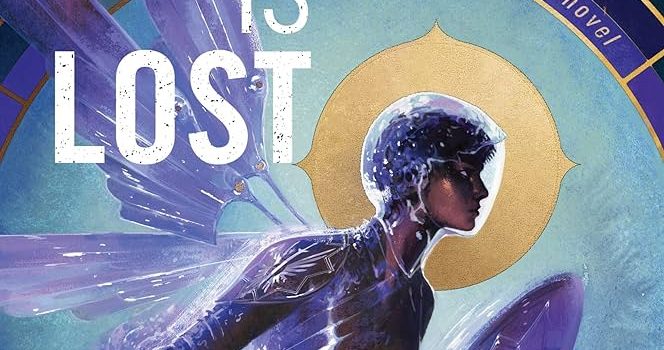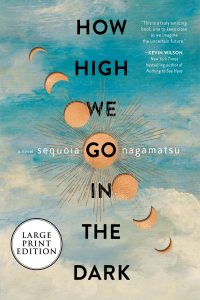Liz Bourke Reviews Where Peace Is Lost by Valerie Valdes
 Where Peace Is Lost, Valerie Valdes (Harper Voyager US 978-0-06-3085930, $19.99, 392pp, tp) August 2023. Cover art by Serena Malyon. Cover by Owen Corrigan.
Where Peace Is Lost, Valerie Valdes (Harper Voyager US 978-0-06-3085930, $19.99, 392pp, tp) August 2023. Cover art by Serena Malyon. Cover by Owen Corrigan.
Valerie Valdes’s Where Peace is Lost is her fourth novel, after a well-received debut space opera trilogy. Where Peace is Lost sets itself in a different science fiction continuity, with different characters, and spends most of its time on a single planet: It feels like a planetary romance, a style of space opera that I haven’t seen very often in recent years.
Kel Garda has been living on the remote, isolated planet of Loth for the last five years, refugee from her home’s lost war with relentless Pale empire. Loth isn’t a rich planet, nor possessed of resources to draw the attention of the Pale, but it has a very communitarian, co-operative society, one with strong feelings about responsibility towards the land and its ecosystems. Kel’s kept a low profile and her past to herself. She was once a member of a martial order devoted to protecting healers and diplomats, her home’s first and most effective line of defence, but the treaty the Pale forced on them disbanded all the martial orders and scattered their members to the winds. The Pale will kill her if they find her, and worse, might take it out on the Order of Mercy, the organisation of healers and social workers that the treaty allowed to continue in existence.
When her young friend Lunna brings word of a dormant Pale war machine suddenly reactivated, Kel finds her past life feeling much more present. If the giant automated machine isn’t stopped, it’ll devastate everything in its path. Thousands of people will be made homeless, and whole ecosystems may be wiped out. In the worst case scenario, it could lay waste to everything and everyone on the planet. When a pair of strangers from off-planet offer to deactivate the war machine for a suspiciously reasonable price, Lunna volunteers to act as their guide, and Kel can’t quite bring herself to let the innocent young person go alone, even when it means risking the secrecy she’s worked so hard to keep.
The two strangers – charming, flirtatious ship-captain Savvy, and laconic, private, former soldier Dare – have their own secrets and their own goals, but it turns out they’re honest about their desire to turn off the war machine, and their potential ability to do so. War machines don’t just turn on by themselves, though. A group of Pale soldiers turned this one on in order to extort a huge payout from the populace, indifferent to the death and suffering that would ensue. They could turn it back on very easily, or worse, let loose other war machines stored in a remote, disused Pale military base. And if they learn who Kel is, who Kel used to be, they might burn the whole planet to get to her. And Kel won’t let that happen. Kel will hand herself over for execution first.
The setting of Where Peace Is Lost is an interesting one. Wider politics are left to the background, though there’s a sense of a vast and complex world of states, polities, connections, rebels, and outcasts waiting in the wings. The action takes place on Loth, which has a very direct but also distributed sort of democracy, a society whose outlines make sense even if we get few details. Valdes builds a very physically grounded, believable world, a very earthy sense of place and inhabitants, into the forests and swamps of this part of Loth: a world whose people are integrated into their landscape in ways that feel real. The characters, too, feel real and grounded: people with needs and wants, hopes and fears, pasts and futures and misconceptions.
Valdes’s novel is surprisingly thoughtful and meditative for a narrative that has the tension and excitement of an action-adventure thriller. Kel comes from an order whose martial capabilities, while considerable, were dedicated towards protection. She values the lives even of her enemies, and if the choice is only between her survival and theirs, she chooses to prioritise their lives over her own. Her history, and her capabilities, are revealed in measured increments over the course of the story, a pace of revelation that makes sense even though the novel is told from her perspective, because she tries hard not to think of it. Kel is a deeply appealing character. She has very strong feelings about killing being unethical, and she’s so committed to her morals that she’s willing to die rather than kill, if that’s the least harmful course. She’s extremely competent in her skills. She’s awkward around people, in part because she’s kept herself isolated from even trying to make meaningful connections for years, and in part because of the deep grief and trauma that lie at the heart of her isolation. Kel’s lost everything that meant anything to her once already, and she hasn’t found other bonds or other causes to take their place. If she’s to live, she has to decide what she’s living for, and not just what she’s running from.
Kel and her background is reminiscent of the very first Star Wars film’s Obi-Wan Kenobi, before the Jedi existed as more than a single mystic warrior-guardian who accepts death rather than strike his enemy down. Science fiction and fantasy have a preponderance of (characters who are or were members of) martial orders, some purely dedicated to some form of violence and some who pay lip service to the idea of the sanctity of life. There are few who go beyond lip service to actually wrestle with the ethics involved in being a trained killer who strives to preserve life, even the lives of one’s enemies, and the sheer belief and commitment required to live a life in line with those ethics. There are damned few action-adventure novels whose protagonist doesn’t level up through greater and greater feats of murderous violence. Where Peace Is Lost is one of them. It’s well paced and well characterised, but it stands out in part because it doesn’t choose the easy, well-trodden path where it comes to violence. Kel doesn’t abandon her ethics, or her sense of self: doesn’t choose to kill from expediency and have to angst about reconciling her morals with newly chosen necessity. Where Peace Is Lost, rather, sees her choosing to keep her ethics, even in extremis, to reclaim her identity as a protector rather than a refugee in hiding, to kill only when she can find no other option to protect others.
That makes it a deeply felt, deeply moving novel. And a very effective one. If you’re looking for something fun, fast, and unexpectedly thoughtful, give this one a try. There are few science fiction novels in the last two decades I’ve enjoyed more, or found more entertaining. It helps that Valdes isn’t lecturing on ethics, but making thematic arguments. It also helps that she doesn’t worry about explaining the technological underpinnings of the cool shit she introduces. It doesn’t matter how Kel’s armour works, just that it does (and that it’s freaking awesome). Any sufficiently advanced technology is indistinguishable from magic, after all, and what matters here are the characters.
Where Peace Is Lost is a fantastic novel. I loved it, I recommend it wholeheartedly, and I want it to have sequels. Many, many sequels.
Liz Bourke is a cranky queer person who reads books. She holds a Ph.D in Classics from Trinity College, Dublin. Her first book, Sleeping With Monsters, a collection of reviews and criticism, is out now from Aqueduct Press. Find her at her blog, her Patreon, or Twitter. She supports the work of the Irish Refugee Council and the Abortion Rights Campaign.
This review and more like it in the October 2023 issue of Locus.
 While you are here, please take a moment to support Locus with a one-time or recurring donation. We rely on reader donations to keep the magazine and site going, and would like to keep the site paywall free, but WE NEED YOUR FINANCIAL SUPPORT to continue quality coverage of the science fiction and fantasy field.
While you are here, please take a moment to support Locus with a one-time or recurring donation. We rely on reader donations to keep the magazine and site going, and would like to keep the site paywall free, but WE NEED YOUR FINANCIAL SUPPORT to continue quality coverage of the science fiction and fantasy field.
©Locus Magazine. Copyrighted material may not be republished without permission of LSFF.








